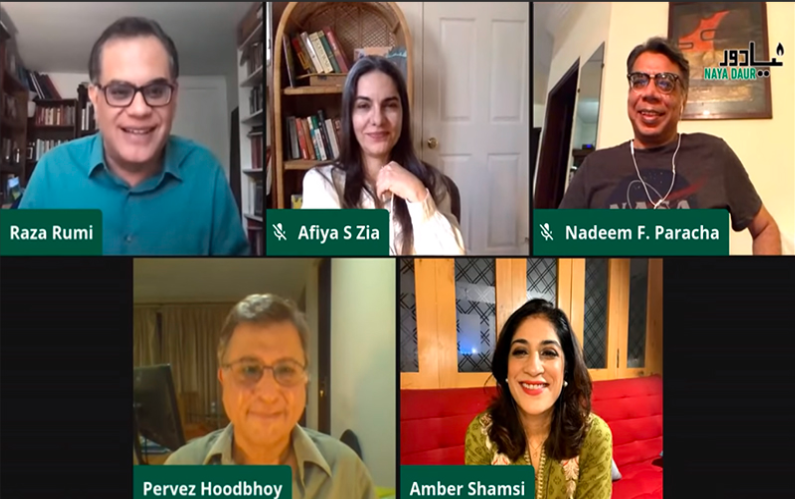
In her article on Medium (full text here), Laxmi Murthy, an editor at The Story writes about new spaces in Pakistani journalism created by Naya Daur Media, as it strives to uphold diversity of opinion and freedom of speech, while breaking away from entrenched taboos in Pakistan's mainstream media and general discourse.
Reeling under multiple crises of falling revenue, job losses, state regulation and censorship accompanied by high occupational risks (Pakistan regularly ranks among “most dangerous” countries for journalists), content remains confined to sensation, politics and celebrity stalking.
Enter Naya Daur Media (NDM) (Naya Daur translates as “new age”), a bi-lingual online citizen journalism portal which promises to “project Pakistan’s diversity and pluralism”. It’s trying to break the boundaries and conventions of legacy journalism says founder editor Raza Rumi, by involving Pakistan’s youth and citizens who are already producing online content:
“The idea is to get those voices, filmmakers, videographers, to give space to engage with ongoing issues of Pakistan.”
Though inspired by “movement journalism”, he insists that NDM is not “just” a progressive platform. Their model of journalism aims to deconstruct hierarchies between editors, reporters and contributors and work collaboratively to both produce and present media content.
As in most of South Asia, Pakistani media, especially electronic, is largely corporatised or state controlled. The result? Television (and the less significant print) ignores key issues such as women’s rights, human rights, climate change, youth affairs, child sexual abuse -- unless it’s sensational enough to lure viewers or blame the political party in power.
News at NDM is carefully curated. “We only pick up news where we showcase what mainstream is not covering, for example sexual harassment in schools, public offices, universities. We have been the ones to consistently follow up and publish commentaries and analysis. We critique the neo-liberal model of growth and talk about redistribution of wealth and overcoming inequalities,” says Raza.
While a wholly crowd-funded, citizen-driven platform is the goal, Google ads help revenue generation, though rates are lower in South Asia. Advertisements from non-profits, foundations and charities are also in the pipeline, in the hope that a savvy marketing team can sell the idea of independent journalism.
“We’re not in favour of putting content behind paywalls because the economy has drastically shrunk. It is unwise to expect people to pay when they are struggling for their daily needs.”
Read more here.
Reeling under multiple crises of falling revenue, job losses, state regulation and censorship accompanied by high occupational risks (Pakistan regularly ranks among “most dangerous” countries for journalists), content remains confined to sensation, politics and celebrity stalking.
Enter Naya Daur Media (NDM) (Naya Daur translates as “new age”), a bi-lingual online citizen journalism portal which promises to “project Pakistan’s diversity and pluralism”. It’s trying to break the boundaries and conventions of legacy journalism says founder editor Raza Rumi, by involving Pakistan’s youth and citizens who are already producing online content:
“The idea is to get those voices, filmmakers, videographers, to give space to engage with ongoing issues of Pakistan.”
Though inspired by “movement journalism”, he insists that NDM is not “just” a progressive platform. Their model of journalism aims to deconstruct hierarchies between editors, reporters and contributors and work collaboratively to both produce and present media content.
As in most of South Asia, Pakistani media, especially electronic, is largely corporatised or state controlled. The result? Television (and the less significant print) ignores key issues such as women’s rights, human rights, climate change, youth affairs, child sexual abuse -- unless it’s sensational enough to lure viewers or blame the political party in power.
News at NDM is carefully curated. “We only pick up news where we showcase what mainstream is not covering, for example sexual harassment in schools, public offices, universities. We have been the ones to consistently follow up and publish commentaries and analysis. We critique the neo-liberal model of growth and talk about redistribution of wealth and overcoming inequalities,” says Raza.
While a wholly crowd-funded, citizen-driven platform is the goal, Google ads help revenue generation, though rates are lower in South Asia. Advertisements from non-profits, foundations and charities are also in the pipeline, in the hope that a savvy marketing team can sell the idea of independent journalism.
“We’re not in favour of putting content behind paywalls because the economy has drastically shrunk. It is unwise to expect people to pay when they are struggling for their daily needs.”
Read more here.
